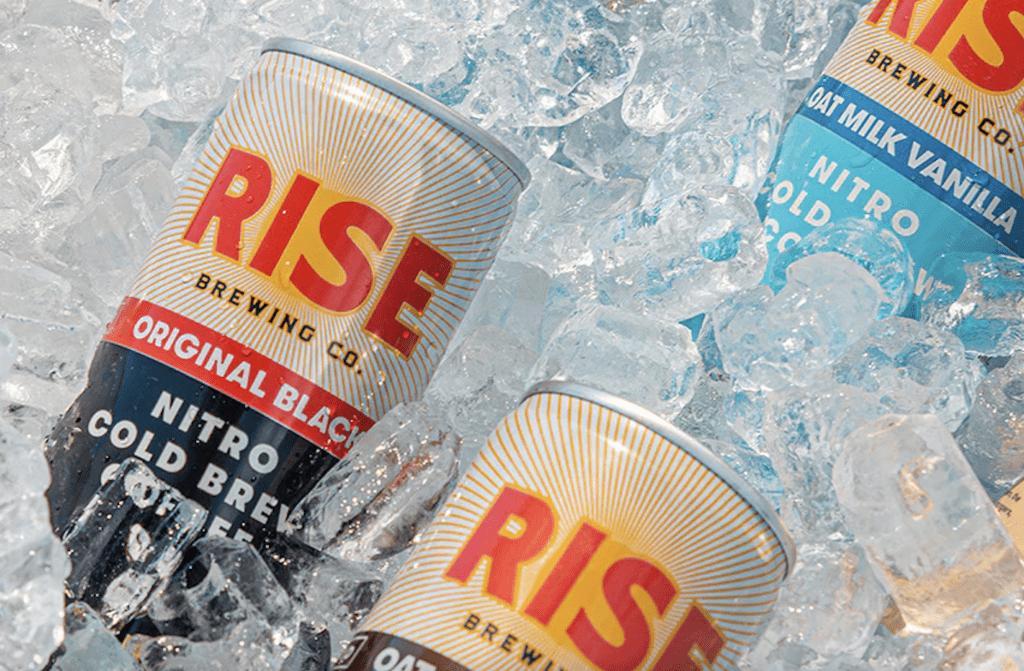PepsiCo has beaten a lawsuit waged against it for allegedly co-opting the trademark of a smaller canned-coffee company, Rise Brewing, by way of its “Mtn Dew Rise” energy drink. In the trademark infringement complaint that it filed against PepsiCo back in 2021, Stamford, Connecticut-based Rise Brewing argued that the beverage behemoth had been using its “immense marketplace weight and nationwide distribution network to flood the market” with similarly-named products, namely, its “Mtn Dew Rise” energy drink, that are not only likely to cause confusion among consumers about the source of the products but may also serve to “squeeze senior user Rise Brewing out of the market” in the process.
Siding with PepsiCo in an order on August 2, Judge Lorna Schofield of the U.S. District Court for the Southern District of New York granted the Mountain Dew-maker’s motion for summary judgment. After analyzing the Polaroid factors, the judge determined that “there is no genuine question of fact to be put to a jury on the likelihood of consumer confusion,” and thus, PepsiCo is entitled to summary judgment on its trademark and unfair competition claims. (The decision follows from an earlier win for Rise Brewing when the district court awarded it a preliminary injunction, barring PepsiCo from marketing its “Mtn DEW Rise Energy” energy drink. The injunction decision was reversed on appeal to last year. The Second Circuit disagreed with the lower court in terms of the strength of Rise Brewing’s mark, finding that associations between the word “Rise” and coffee make it a suggestive mark entitled to narrow protection.)

In connection with her analysis of the Polaroid factors, Judge Schofield noted that the correct premise in a “strong reverse confusion case” is that “a mark that is inherently strong, but not strongly associated with the plaintiff (i.e., one that has not acquired a secondary meaning), is both deserving of protection and is likely to be the subject of consumer confusion.” In such a case, “the first Polaroid factor tips strongly in favor of a plaintiff who holds such a mark,” according to judge, who found that Rise Brewing’s mark is “inherently weak.” Rise Brewing offers “some evidence of acquired distinctiveness” (namely, evidence of advertising spending and product awards, as well as a declaration from its CEO), but the court ultimately found that “the record as a whole with respect to acquired meaning … does not overcome the inherent weakness of the mark.”
Against that background, and given the Second Circuit’s finding “as a matter of law that [Rise Brewing’s] mark is weak, its conclusion that it is ‘clear error’ to find that the parties’ products are similar, and its statement that ‘[t]o the extent that [PepsiCo’s] use of its marks caused any likelihood of confusion … because [Rise Brewing] chose a weak mark in a crowded field,’” the court granted summary judgment to PepsiCo.
Recent Reverse Confusion Cases
While trademark infringement actions that center on allegations of reverse confusion are relatively rare compared to the much-more-frequent traditional forward-confusion trademark infringement cases, it is worth noting that the decision over Rise Brewing v. Mtn Dew Rise is, nonetheless, the latest in a string of cases, in which smaller entities have waged reverse confusion claims against larger market counterparts, to varying levels of success. The win for PepsiCo follows somewhat closely from the filing of a reverse confusion case against Facebook and Instagram-owner Meta after its rebranding, for example. In that case, which is in its early stages in the Southern District of New York, Pryor Cashman-represented METAx, a small virtual reality-focused company, accuses the social media titan of “brazenly violat[ing] fundamental intellectual property rights enshrined in U.S. law to obliterate” a business that has been using the Meta name for more than ten years.
A handful of other relatively recent reverse confusion matters – i.e., ones in which the plaintiff is typically a commercially smaller but more senior user of the mark, and the defendant is a commercially larger but more junior user – include …
– Wreal v. Amazon.com: In June 2022, the U.S. Court of Appeals for the Eleventh Circuit held that the case that Wreal lodged against Amazon – in which it argued that Amazon’s “Fire TV” trademark infringed its own “FyreTV” mark – should be tried before a jury. In particular, on the heels of the district court dismissing the adult film company’s trademark infringement claims against Amazon, the Eleventh Circuit found that by treating the case as a straightforward infringement matter, the district court erred in its application of the likelihood of confusion factors.
Holding that there are “several important differences in how the seven likelihood-of-confusion factors apply in reverse-confusion cases versus forward-confusion cases,” the appeals court used the opportunity to highlight those distinctions. For instance, in a forward-confusion trademark infringement case, the first factor, the distinctiveness of the mark, is analyzed exclusively by looking at the strength of the plaintiff’s mark, whereas in a reverse confusion scenario, the court stated that the distinctiveness of the mark should be analyzed by comparing the relative commercial strength of the defendant’s mark together with the conceptual strength of the plaintiff’s mark. (Loeb & Loeb has a good run-down of additional distinctions.)
Ultimately, the Eleventh Circuit reversed the earlier summary judgment decision in favor of Amazon, and held that Wreal’s infringement claims should go before a jury.
– Rhode-NYC, LLC v. Rhodedeodato Corp: In another still-pending case, Hailey Bieber’s brand is facing a trademark infringement suit. The model’s skincare brand was sued last year by older-but-smaller fashion brand Rhode-NYC for allegedly adopting a similarly-named brand – Rhode – for her own brand, and “swamping [Rhode-NYC’s] market presence,” and giving rise to reverse confusion in the process. In an early win in July 2022, a New York federal court refused to issue a preliminary injunction that would have required Bieber’s brand to stop using the name “Rhode” for the duration of the case.
– Beauty Concepts LLC v. West: In a separate celebrity skincare/beauty brand reverse confusion case, Beauty Concepts filed a since-settled trademark suit against Kim Kardashian and Coty, Inc. In the complaint that it lodged in June 2022, Brooklyn, New York-based Beauty Concepts, which does business as SKKN+, claimed that the mega-star and her cosmetics manufacturing partner were on the hook for trademark infringement and unfair competition, as well as civil conspiracy under New York common law, for launching the “confusingly similar” SKKN by Kim brand and using the mark on goods and services that are “identical to, or highly related to, services offered by Beauty Concepts under [its own] SKKN+ trademark.” That case settled early this year ahead of any substantive developments.
– Aliign Activation Wear, LLC v. Lululemon Athletica: Lululemon managed to beat the reverse confusion-focused trademark infringement case that was waged against it back in 2020 by a Los Angeles-based lifestyle brand. According to a complaint (and subsequent amended complaints) that it filed with a California federal court in April 2020, Aliign Activation Wear claimed that Lululemon was “willfully infringing … [its] Aliign trademark,” which the company said it has been using since 2011, at least 5 years before its larger rival rolled out a collection of its own “Align” wares.
The U.S. District Court for the Central District of California denied Aliign’s motions for summary judgment on the basis that “no reasonable juror could find a likelihood of forward confusion, reverse confusion, or initial interest confusion.” In appeal, the Ninth Circuit found that Aliign had “failed to raise a triable issue of fact as to whether reasonably prudent consumers encountering [its] goods will likely believe that those goods are manufactured or sponsored by lululemon.” Among other things, the appeals court held that “the near absence of any overlap in [the parties’] marketing or distribution channels weighs heavily against a finding that reverse confusion is likely here,” the court held. Beyond that, the court stated that the absence of evidence of actual confusion, despite both parties having used their marks for years, “indicates that reverse confusion is unlikely.”
– Ironhawk Technologies, Inc. v. Dropbox, Inc: Ironhawk filed a reverse confusion infringement suit against Dropbox, alleging that the file hosting service’s use of “Smart Sync” intentionally infringes its “SmartSync” mark. A Central District of California judge initially determined that no reasonable juror would find that confusion was likely. The case was revived by the Ninth circuit in 2021, which held that the application of the Sleekcraft factors (as the district court did) is appropriate in a reverse confusion case and that a reasonable jury could conclude that consumers would believe Dropbox is a source of, or a sponsor of, Ironhawk’s Smart Sync. As such, the Ninth Circuit concluded that the lower court had errored in granting summary judgment for Dropbox and remanded the case for trial. The case settled before trial.
THE TAKEAWAY: Successfully waging a trademark infringement case on a reverse confusion basis is generally accepted to be no mean feat. Nonetheless, amid an influx of new brands (thanks to things like e-commerce and social media marketing), the number of cases in which reverse confusion is claimed appears to be on the rise to some extent. However, save for some positive results for plaintiffs in cases like Ironhawk Tech v. Dropbox and Wreal v. Amazon, reverse confusion litigation still seems to be a defendants’ game. Reflecting on the outcome of the Lululemon case last year, for instance, Leason Ellis’ Martin Schwimmer told TFL that it can be filed alongside the Second Circuit’s injunction-overturning decision in the Rise Brewing case as one of the latest examples of “brands with strong house marks defeating reverse confusion claims.”














